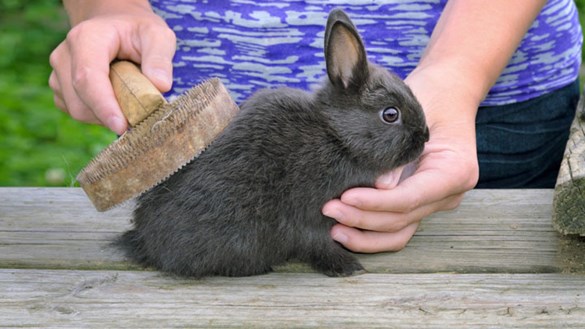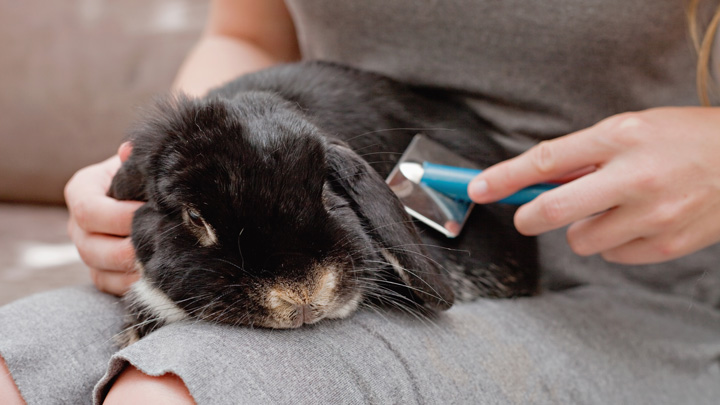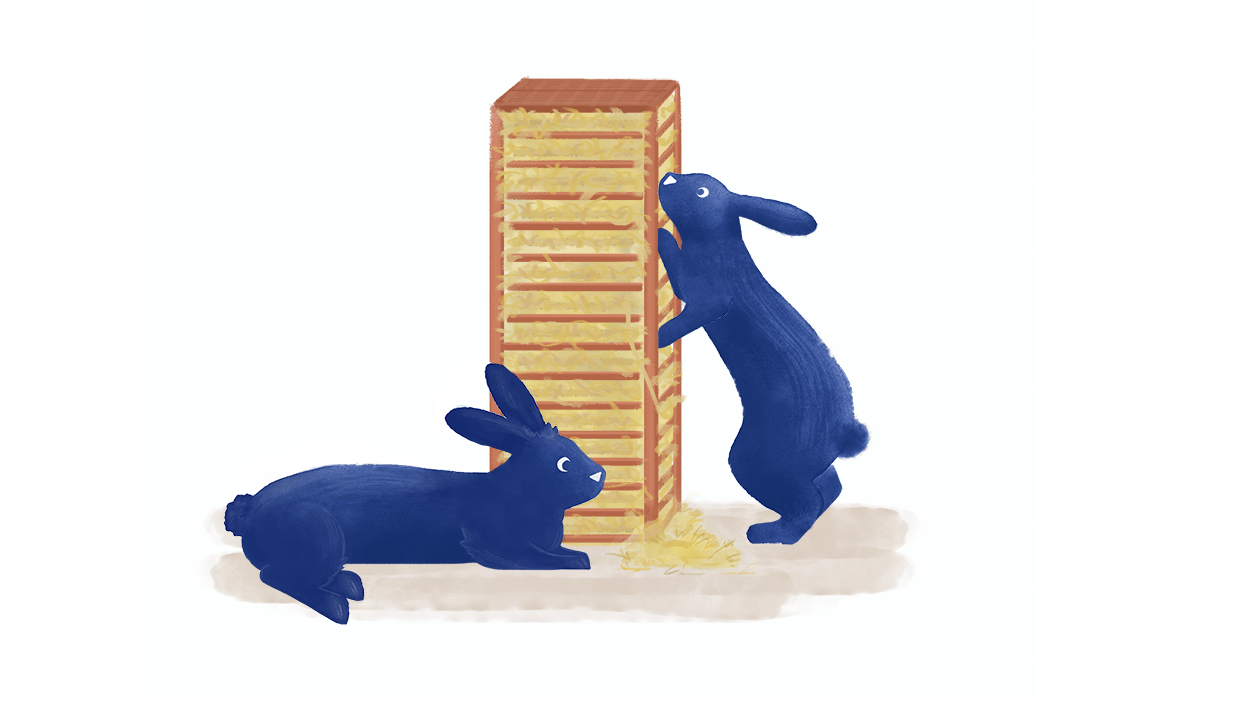Grooming Your Pet Rabbit
Not only does grooming help keep your rabbit’s fur in great condition, it also allows you to give them a full nose-to-tail check with the added benefit of strengthening your bond. Take a look at our tips on how to groom your rabbit.

Why do rabbits need grooming?
Although rabbits regularly groom and wash themselves, it’s important to maintain a good grooming routine to ensure their fur stays in perfect condition.
Long-haired breeds should be groomed daily as they’re more prone to matting and getting dirty. Short-haired breeds should be groomed once a week unless they’re elderly or suffer from arthritis, which can hinder their ability to groom themselves.
Regular grooming is even more important when they’re moulting during spring and autumn.
Rabbits swallow a lot of fur when they groom themselves and, unlike cats, they’re unable to get it out of their system as hairballs. If they swallow too much, it can cause their gut to slow down, which can be dangerous. Regular brushing helps to remove loose fur and minimise the amount they swallow.
What are the best tools for grooming a rabbit?
Depending on your breed of rabbit, there are several tools you can use to groom them. Speak to your vet for advice about which ones are best suited to your rabbit.
Grooming toolkit:
- Slicker brush
- Metal comb
- Double metal comb
- Flea comb
- Rubber brush or mitt
- Soft brush
- Thinning scissors
- Nail clippers

How to groom your pet rabbit
Place your rabbit on a towel on your lap and use a soft bristle brush or a rubber brush for short-haired breeds, and a slicker brush or comb for long-haired breeds.
Use gentle pressure and long, slow strokes in the direction of hair growth to avoid hurting your rabbit. Be extra careful around the ears and eyes and pay attention to areas that can become easily matted, such as around the neck, armpits and tail.
Removing matted fur from a rabbit
If you come across any matts that can’t be brushed out, try gently teasing it out with your fingers, being careful not to pull on your rabbit’s delicate skin.
If this doesn’t work, you may need to cut it out with scissors. If it’s too close to the skin to cut without damaging the skin, ask your vet to use rabbit-friendly clippers to remove the matt.
How to clip your rabbit’s nails
Rabbit nails never stop growing, so will need occasional clipping to prevent them from becoming too long.
Clipping their nails takes practice; you may want someone to hold your rabbit while you clip their nails. Use specialist rabbit nail clippers and be careful not to go too close to the vein and nerve that runs up each nail, known as the ‘quick’.
Light, translucent nails make it easy to see where the quick ends. If your rabbit has darker nails, shine a torch behind them to reveal the quick so that you can keep a safe distance away.
Your vet will be happy to show you the best way to clip your rabbit’s nails with the right tools.

‘Trancing’ rabbits
When grooming, many owners lay their rabbit on the back so that they enter a ‘trance’. This is actually a form of ‘playing dead’ and a sign that they’re terrified. This can be extremely stressful for rabbits, so we strongly advise you not to do this.
To groom their underside, support their back as if they’re sitting up, or support their front paws so that they stand on their back feet, enabling you to groom their belly.
Should rabbits be bathed?
We don’t recommend bathing your rabbit or using water in their grooming routine. Not only is it stressful for them, it also causes the fur to clump together, making it very difficult to dry them completely. Rabbits who are left damp are more at risk of developing respiratory infections and hypothermia.
Give your rabbit a ‘health check’
Grooming provides a perfect opportunity to thoroughly check over your rabbit for any lumps, bumps, cuts or sores. Check between their toes for grass seeds or stones, which can cause discomfort.
You should also check their bottom and tail for signs of flystrike, as well as their eyes and ears for unusual discharge or lodged objects.
If you do find anything concerning, book an appointment with your vet to get it checked out.
Find your local practice

Pet Care & Advice
At Medivet, we’re committed to providing trustworthy, expert advice that helps you care for your pet.
Search advice

Medivet Healthcare Plan
On average our clients save up to £280 each year with the Medivet Healthcare Plan.
Learn more

